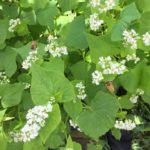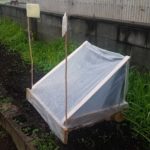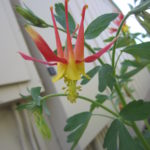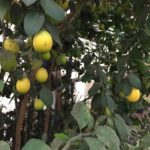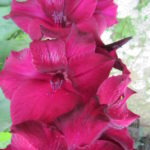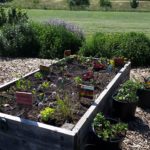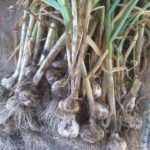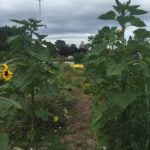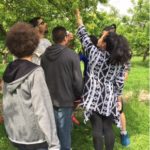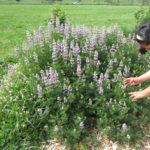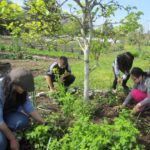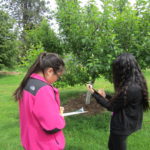About Learning Gardens
History
The Learning Gardens initiative began at PSU in the Graduate School of Education/Leadership for Sustainability Education program in 2002. Under the leadership of Dr. Dilafruz Williams and Dr. Pramod Parajuli, learning gardens have been initiated and supported with grants and staff support in partnership with many schools in Portland. In 2005, the Learning Gardens Laboratory was started. With an Environmental Protection Agency grant, learning gardens were supported at Lewis Elementary School, Buckman Elementary School, and Edwards Elementary School in Portland Public School District, 2005-2008. Several new courses have been developed related to permaculture, garden-based education, learning gardens-curriculum and instruction, and urban education farm.
Current faculty supporting Learning Gardens at PSU are: Dr. Dilafruz Williams, Dr. Heather Burns, and Dr. Sybil Kelley.
Grants/projects that funded these initiatives are as follows, with Dr. Dilafruz Williams as Principal Investigator.
Principal Investigator. National Science Foundation. 2014-2018. Science in the learning gardens: Factors that support racial and ethnic minority students’ success in low-income middle schools. Co-Investigator, Sybil Kelley, Cary Sneider, and Ellen Skinner, awarded a Discovery Research K-12 (DRL 1418270). $449,999.
Principal Investigator. Science in the Learning Gardens research and AERA program development. Institute for Sustainable Solutions, Portland State University, Portland, Oregon. $23,275.
Principal Investigator. Spencer Foundation, 2012-2013. Garden-Based Learning in Green Ribbon Schools: Case Studies of Exemplary Schools. $29,625.
Principal Investigator. Spencer Foundation, 2010-2011. The Effects of Garden Based Learning on Academic Outcomes: A Research Synthesis: $40,000.
Principal Investigator. Oregon Community Foundation, 2007-2008. Curriculum and Teacher Development for Learning Gardens: Academic Achievement, Multiculturalism, and Health. $28,600.
Principal Investigator. Comcast/Portland Schools Foundation grant, 2006-2009. Learning Gardens for Portland Public Schools: Health, Multiculturalism, and Academic Achievement. $75,000. Co-Investigator: Pramod Parajuli.
Co-Investigator. Environmental Protection Agency, 2005-2009. Learning Gardens K-8: Innovations in Food-based Ecological Education Design to promote Academic Achievement, Ecoliteracy, Health and Wellness. $82,000. Principal Investigator: Pramod Parajuli.
Principal Investigator, Metro Nature in the Neighborhood Program, 2006-2007. Restoring Johnson Creek Watershed Through Learning Gardens in Schools and Neighborhoods. $25,000.
Principal Investigator, City of Portland, Portland, Oregon, 2005-2006. 60th Avenue Learning Gardens Laboratory: Health, Multiculturalism, and Academic Achievement $125,000. Co-Investigator: Pramod Parajuli.
Learning Gardens Laboratory
The Learning Gardens Laboratory (LGL) is a 12-acre garden education site located in Southeast Portland that provides K-12, university students and community members hands-on and place-based education in sustainable gardening, healthy nutrition, and permaculture. Education at LGL supports improved academic achievement, leadership development, and the development of sustainable local food systems Established in 2005, LGL exists as a unique partnership between Portland State University, Portland Public Schools, Portland Parks and Recreation, and Oregon State University Extension Service.
The Learning Gardens Lab serves as model of community-based education focused on a hands-on and practical learning tool: the garden. Through garden-based education and outreach, this site serves Lane Middle School students, PSU students, SUN Program participants, Community Transition School students, OSU Extension Service’s beginning farmers and Master Gardeners, and more.
Garden-based Education with Lane Middle School
Graduate students enrolled in Portland State University’s Leadership for Sustainability Education (LSE) Program facilitate weekly garden-based science curriculum for Lane Middle School students in collaboration with our science teacher partners from Lane. Over 175 Lane Middle School students from diverse racial, cultural, and socio-economic backgrounds receive instruction each week; they learn through direct, hands-on experience the process of growing and harvesting food, the science of cooking with whole foods, and the importance of good nutrition and eating habits. Perhaps most importantly, students learn to appreciate the interconnection and complexity of our natural world.
Garden-based Education Research
For several years, a team of researchers from Portland State University’s Psychology department led by Dr. Ellen Skinner conducted ongoing quantitative research about this partnership between the Leadership for Sustainability Education (LSE) program and Lane Middle School, focusing on how participation at the Learning Gardens Lab affects middle school students’ motivation and achievement in school. This team found that middle school students who are more engaged in the Learning Gardens also perform better in school. In fact, despite the high stability of student achievement, engagement in the gardens in the fall predicts improvements in achievement over the school year. Additionally, engagement at LGL leads to more engagement in science, and school in general. These findings are especially important for the students in this study, who are at-risk for poor school performance due to their socioeconomic, minority, and immigrant status (Skinner, 2010). This quantitative study on garden-based education is the only one of its kind in the United States.
Community Education & Outreach
Graduate Assistants from the LSE program also coordinate the Lane Family Learning Garden for Lane Middle School families who are learning to grow their own food. Coordinators help families prepare land, plant seeds and starts, maintain their plot, and harvest vegetables. In addition, PSU graduate students, OSU Master Gardeners and other volunteers harvest produce from LGL and deliver it to local food banks and local schools, where it is distributed to local families who need it. Typically over 1500 lbs of fresh produce from LGL is donated each year.
Service-Learning
Portland State University offers an average of 8-10 senior Capstone service-learning classes per year in partnership with the Learning Gardens Lab, including: Sustainable Food Systems and Learning Gardens and Civic Affairs. Capstone students complete service-learning projects and contribute significantly to the development and maintenance of the site, while learning about sustainable gardening. Additionally, many PSU courses require Community-Based Learning and our site is one where these volunteer hours can be fulfilled.
OSU Extension
Our partners from Oregon State University’s Extension Service demonstrate sustainable, organic farming techniques at LGL through the Beginning Urban Farmer Apprenticeship Program in partnership with Multnomah County. OSU Extension staff also train and mentor students from the Community Transition Center, a Portland Public School on site, in horticulture. OSU Extension staff also oversee the Master Gardener demonstration garden on the east end of the site and coordinate the maintenance of the trees, grass and the many perennial garden beds at LGL.
Location
The Learning Gardens Lab is located in SE Portland on 60th Ave across from Brentwood Park between Duke and Flavel.
Additional Resources
Click here for more resources related to Garden-Based Education and Sustainability Education.

